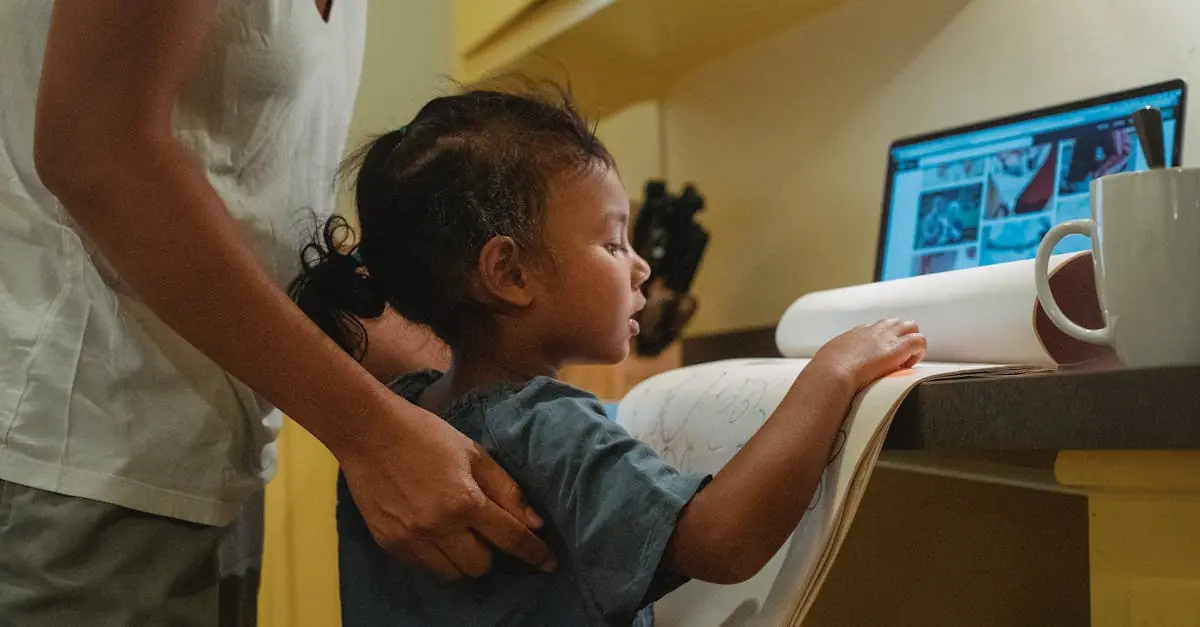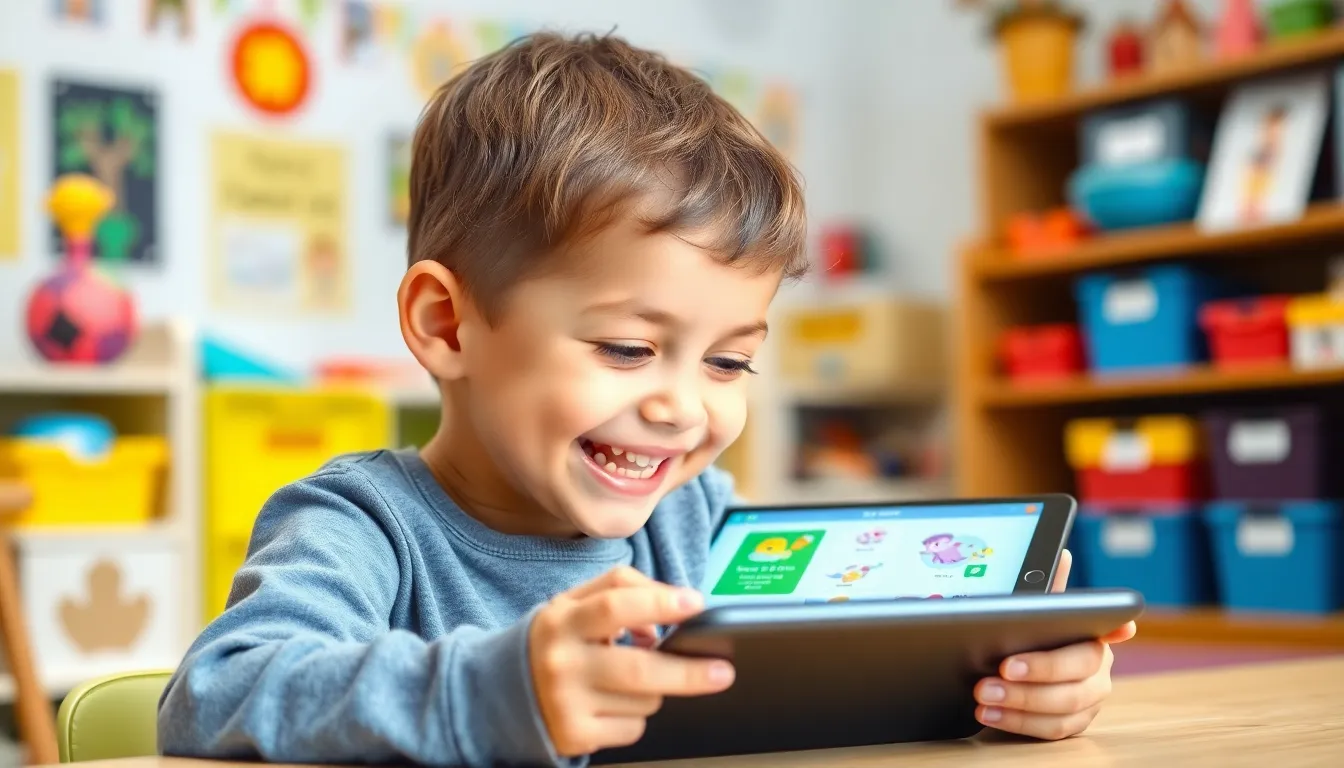Navigating the wild world of parenting can feel like trying to assemble IKEA furniture without the instructions. Luckily, there’s a treasure trove of parenting education resources that can turn chaos into clarity. From expert-led workshops to engaging online courses, these tools are designed to help parents tackle everything from toddler tantrums to teenage eye rolls.
Table of Contents
ToggleOverview of Parenting Education Resources
Parenting education resources encompass a variety of tools designed to assist parents in navigating child development issues. These resources include expert-led workshops, online courses, and interactive webinars that cover diverse topics. Workshops often occur at community centers, offering face-to-face interaction with trained professionals.
Online courses allow parents to learn at their convenience, covering subjects such as effective discipline techniques, communication strategies, and developmental milestones. Interactive webinars enable parents to engage with experts in real-time, allowing for direct questioning and tailored advice.
Books serve as another valuable resource, providing insights from experienced authors in parenting psychology. Many books target specific age groups, offering practical advice for handling challenges from newborns to teenagers. Websites also play an essential role in disseminating information on parenting techniques, mental health resources, and expert blogs.
Mobile applications provide on-the-go access to parenting tips, reminders for developmental check-ups, and tools for tracking milestones. Some apps include forums for parents to connect with others, fostering a sense of community and support.
Support groups serve a vital role in parenting education, offering emotional backing and shared experiences. These groups often focus on specific challenges, such as single parenting or managing special needs, ensuring participants find relevant support.
Organizations dedicated to family wellness frequently provide resources tailored for diverse parenting styles. Resources offered include newsletters, podcasts, and access to research-based articles designed to keep parents informed and proactive in their approach.
Using these resources effectively empowers parents to tackle challenges confidently and enhances their parenting skills.
Types of Parenting Education Resources
Parenting education resources come in various forms, catering to different needs. They help parents navigate challenges and improve skills.
Books and Literature
Books provide a wealth of knowledge about parenting techniques and child development. Often, these resources cover topics like discipline, communication, and understanding children’s emotions. Popular titles from respected authors can guide parents through specific age group challenges. Many parents find inspiration and practical insights in these pages. Literature often serves as a reliable reference point for those seeking advice on daily dilemmas.
Online Courses and Webinars
Online courses offer flexibility, allowing parents to learn at their own pace. Many platforms feature structured programs that encompass diverse topics, from effective discipline strategies to building self-esteem in children. Webinars foster real-time interaction, enabling participants to ask questions and engage with experts. This format enhances understanding while building a supportive community among parents facing similar challenges. Resources like recorded sessions further allow for repeated learning.
Community Programs and Workshops
Local community centers host workshops that encourage parent participation. These face-to-face events create opportunities for sharing experiences and gaining insights from professionals. Parents can connect with others while learning about child development and effective parenting strategies. Workshops often include practical activities, making them engaging and informative. Community programs also strengthen local support networks, offering emotional backing for families during difficult times.
Importance of Parenting Education
Parenting education resources play a crucial role in helping families navigate the complexities of raising children. These resources empower parents, equipping them with knowledge and skills essential for effective parenting.
Benefits for Parents
Parents gain numerous advantages through education. Practical strategies emerge from workshops, enhancing everyday parenting challenges. Increased confidence builds as parents learn about child development, discipline techniques, and emotional support. Community support forms within parenting groups, fostering relationships with others facing similar challenges. Online platforms provide flexibility, allowing parents to learn at their own pace. Workshops and courses also introduce evidence-based practices that contribute to improved family dynamics. Through these resources, parents access valuable insights, transforming their approach to child-rearing.
Impact on Child Development
Child development benefits significantly from informed parenting practices. Research correlates positive parenting strategies with enhanced social and emotional skills in children. Well-informed parents often create nurturing environments that promote healthy development. Personalized strategies direct children toward increased academic success and behavioral regulation. Children also experience lower stresses and behavioral issues when parents implement learned techniques. The impact extends beyond immediate behavior, shaping positive long-term outcomes, including resilience and self-esteem. Children thrive in settings where parents are engaged and educated, highlighting the importance of ongoing parenting education.
How to Choose Parenting Education Resources
Choosing quality parenting education resources requires careful consideration. Parents should prioritize credible sources to ensure reliability.
Assessing Credibility
Assessing the credibility of resources is vital. Look for materials created by experts, such as child psychologists or experienced educators. Researching the author’s background offers insight into their qualifications. Check for reviews or testimonials from other parents, as feedback often highlights effectiveness and trustworthiness. Peer-reviewed articles can also provide factual information that supports learning. Reliable organizations, including the American Academy of Pediatrics, offer evidence-based guidance. When evaluating online content, consider the website’s authority and mission statement. Ensuring resources come from respected platforms enhances the chances of gaining accurate, useful information.
Considering Personal Parenting Styles
Considering personal parenting styles shapes the choice of resources. Assessing one’s beliefs and values can clarify what resonates with them. Different techniques align with various parenting philosophies, such as attachment or authoritative approaches. Identifying what works for their family leads to better engagement. Some parents may prefer structured methods, while others seek flexibility. Resources that align with specific styles foster deeper understanding and adaptation. Finding materials that speak to individual needs encourages motivation and confidence in parenting practices. Ensuring the resources match their unique circumstances enhances the likelihood of applying new strategies effectively.
Conclusion
Parenting education resources play a vital role in shaping confident and informed parents. By utilizing workshops online courses and community programs parents can enhance their skills and adapt their approaches to meet their children’s needs. These resources not only provide practical strategies but also foster a sense of community among parents facing similar challenges.
As parents invest time in their education they contribute to their children’s emotional and social development. The journey of parenting is complex but with the right tools and support it can be a rewarding experience. Embracing ongoing learning will ultimately lead to healthier family dynamics and positive long-term outcomes for both parents and children.








